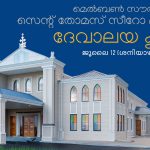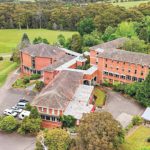“because they are in a mad rush to make their lives”: Bishop Bosco Puthur
Kochi:Caring for migrant Syro-Malabar Catholics in “secularized and westernized” Australia offers challenges for a traditional Catholic mission, said Bishop Bosco Puthur, who recently completed one year on the continent.
“It is a challenging mission in all respects and has both positive and negative aspects,” Bishop Puthur told ucanews.com in late August while he was in Kerala attending the synod of Syro-Malabar bishops.
The Kerala-based Eastern Catholic Church’s first diocese in Australia — the Eparchy of St. Thomas the Apostle of Melbourne — was established in January 2014, with Bishop Puthur, 69, taking over as its first bishop in March.
The bishop said Australia’s Latin-rite leadership has been “very receptive, encouraging and understanding of the needs of the Church.”
The bishop’s comments come amid reported friction between the Syro-Malabar Church and India’s majority Latin-rite bishops who have been resistant to the Eastern-rite Church demanding more “administrative structures” and dioceses outside the Church’s base in the southern Indian Kerala state.
In contrast, Catholics from nearly all Eastern-rite churches are present in Australia.
“The Church in Australia accepts and appreciates the verity of the global Church and does everything possible to nurture it,” Bishop Puthur said.
As Australia is a “nation of migrants” and lives in “a multicultural and westernized” society, “people in general are not worried about migrants. That is a positive thing,” the bishop said.
“Our people also are excited about having a permanent system for having liturgy and sacraments in the language and rite they grew up with,” Bishop Puthur said, noting that almost all of Australia’s 50,000 Syro-Malabar Catholics are first-generation migrants from Kerala.
Syro-Malabar Catholics follow the Chaldean tradition because of ancient Kerala’s maritime link with West Asian nations. They trace their apostolic lineage to St. Thomas, who according to tradition landed on the southern coast of Kerala during the first century.
The first Syro-Malabar eparchy outside India was established in Chicago in 2001. The eparchy in Melbourne was second.
Challenging young mission
Large-scale migration from Kerala to Australia began during the past two decades.
“That means most of our people are young, preoccupied with education and jobs. They are struggling to settle in an unknown land and culture. They don’t have much time for Church and its activities,” the bishop said.
Bishop Puthur said that as Indian migrants assimilate to their new surroundings, formation for future generations will be more difficult for the Church.
There are situations of “our people skipping” Sunday Mass and not waiting for children to attend catechism classes “because they are in a mad rush to make their lives.”
Lack of appropriate structures and personnel also challenge the diocese. Most Sunday services and catechism classes are conducted in Latin churches once the local parish’s activities have concluded. “So we get only odd timings for our services,” Bishop Puthur said.
The Church has 17 priests to attend to two parishes and 40 mission stations, covering a vast geographical area stretching across three time zones. “It is simply not possible to give Sunday Masses to all centers on every week.”
In some cases, a priest has to travel more than 1,500 kilometers one way to celebrate Mass, the bishop said. Round-trip travel is tiresome, and flying every week is cost prohibitive. “We don’t have that kind of money. Our communities are not rich,” he said.
“This situation reminds me of what we have always known about classical mission areas,” the bishop said.
Report from ucanews.com Website.






